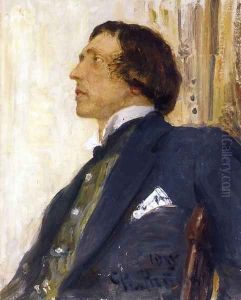Ilia Yefimovich Repin Paintings
Ilia Yefimovich Repin was a leading Russian painter and sculptor of the Peredvizhniki artistic school, an innovative movement that protested against the restrictions of academic art. Born on August 5, 1844, in the town of Chuguyev, in the Kharkov Governorate of the Russian Empire (present-day Ukraine), Repin demonstrated an early talent for art. His initial education was at a military school, which he followed with studies at the Imperial Academy of Arts in Saint Petersburg from 1864 to 1871. His time at the Academy was pivotal, as it shaped his desire to portray real-life subjects with psychological depth and social awareness.
Repin's work often reflected the social and political climate of Russia, capturing the spirit of his time with an unparalleled realism. His art was characterized by its empathetic portrayal of peasants and common folk, as well as notable figures and historical events. One of his most famous works, 'Barge Haulers on the Volga' (1870-1873), epitomizes his approach to art, showing the grueling conditions of laborers with a profound sense of humanity and strength. This painting, among others, helped establish Repin as a key figure in Russian art, admired for his ability to combine realism with the emotional intensity.
Aside from social and historical themes, Repin also excelled in portraiture, capturing the likenesses of many prominent personalities of his time, including composer Modest Mussorgsky and author Leo Tolstoy, with whom he developed a close friendship. His portraits are celebrated for their psychological depth and the skillful depiction of the subject's character.
Repin's influence extended beyond his own artworks. He was a respected teacher at the Imperial Academy of Arts, where he taught from 1894 until his resignation in 1907, advocating for artistic freedom and innovation. His legacy is not only in his contribution to the realism movement in Russian art but also in his role in mentoring the next generation of artists.
In the later years of his life, Repin settled in Finland, then part of the Russian Empire, where he continued to paint, exploring new subjects and techniques until his death on September 29, 1930. Today, Repin's works are housed in major museums across Russia and the world, remaining a testament to his profound impact on the art of the Russian Empire and beyond. His life and oeuvre are celebrated for their profound humanity, technical mastery, and deep engagement with the social issues of his time.
